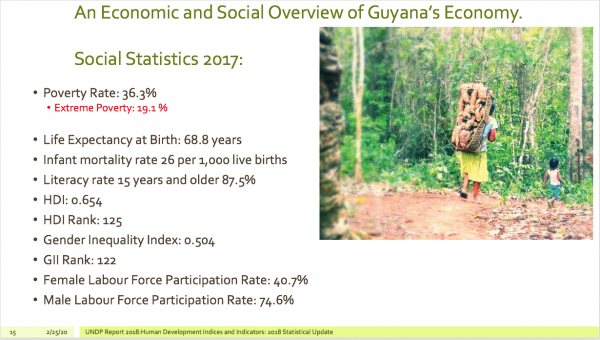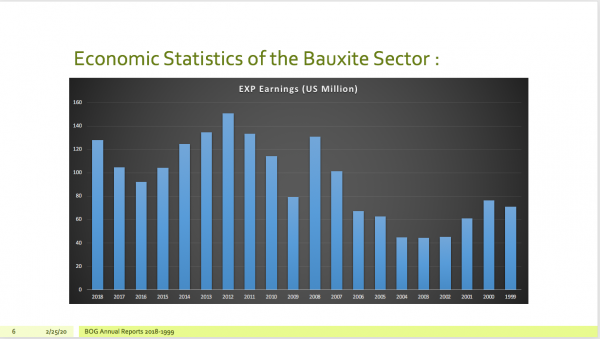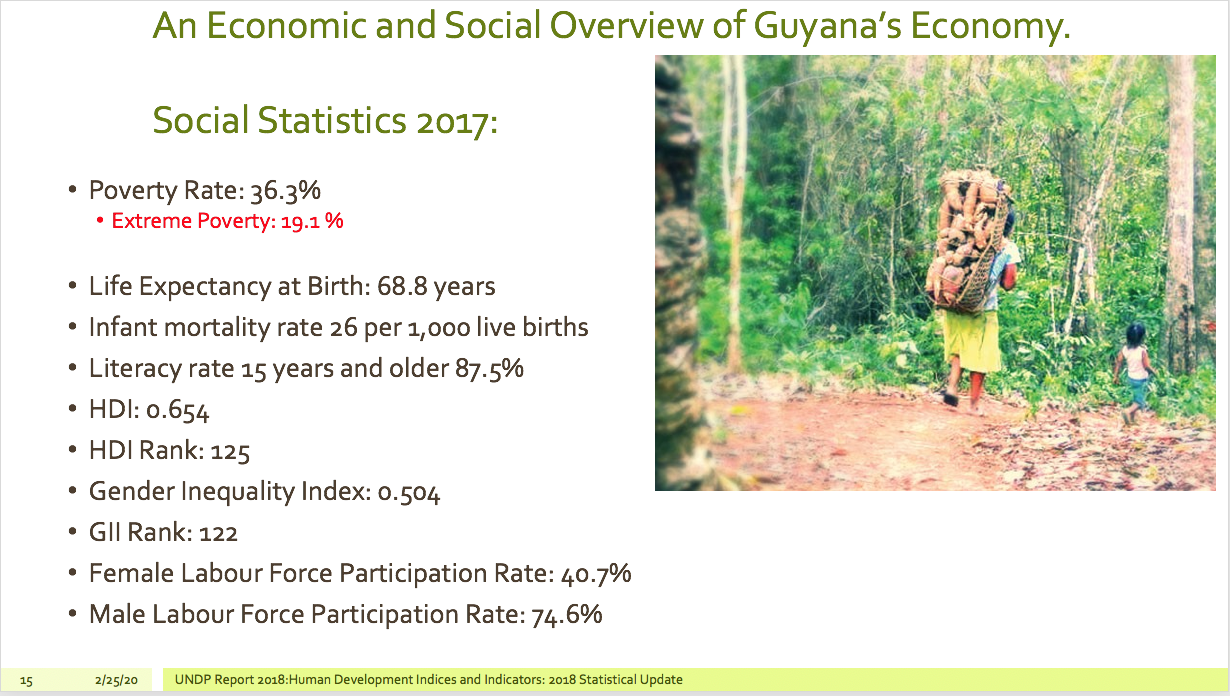Event Panel: presentations and a discussion
Host Moray House Trust
Date Monday 17th February 2020

Guyana has mined bauxite for the same length of time that Trinidad & Tobago has extracted oil: a century. What lessons have we learned and are we applying them to our nascent petroleum industry? These were some of the questions discussed last night at a poorly attended forum at Moray House Trust moderated by Elsie Harry.
Mr Sydney Armstrong (from the University of Guyana Department of Economics) reminded us that a substantial slice of our population lives below the poverty threshold, with a fifth classified as very poor. Almost a half have only a primary school education. These are significant challenges for any country, particularly one earmarked for exponential (oil-related) growth. He also showed that though our bauxite output had remained fairly consistent, employment levels have dropped significantly over time.

Mr Lincoln Lewis spoke about the deprivation experienced by those in Mackenzie (as it then was) who were not employed in the bauxite industry: they could not use the hospital in the town. Even those employed by Demba had to leave the houses provided by the company once their employment ended. These circumstances created a sense of transience in the community. Mr Lewis touched briefly on the current struggles with Rusal and asked if we are unable to exert much influence on Rusal, how will we manage our affairs with the corporate giants in the petroleum industry?
Mr Chris Ram noted lapses in protocols and procedure with regards to the petroleum sector under both administrations, the PPP/Civic and APNU/AFC. He called for a comprehensive audit and investigation of all actions and decisions taken from the awards of blocks in the 1990s to the renewal of the PSA with EEPGL (ExxonMobil’s local subsidiary) in 2016. He suggested that an ‘international commission of inquiry’ led by a range of credible international NGOs might be a useful counter to the polarised narratives emerging locally. He also suggested that it was time to move from GDP as a measure of our ‘development’ to GNI.
There was a lively and extended questions and comments session at the end. It was suggested that Guyana should ‘sell’ her projected oil wealth now on the oil futures market for a smaller lump sum of two-thirds of the total (payable now), which would have the benefit of transferring oversight of Guyana’s take to hedge funds or other entities better equipped to deal with it and of creating a substantial Sovereign Wealth Fund generating enough interest for a host of transformative projects.
There was some discussion of what the fate of the alumina plant (built in the 1950s and closed in 1982) meant in the context of proposals to build an oil refinery in Guyana. Would an oil refinery suffer a similar fate? Mr Armstrong pointed out that a refinery would cost roughly the same as three hydro-power plants on the scale of Amaila Falls. Mr Ram felt that an oil refinery need not be a state funded project but that it might represent a significant opportunity for the private sector.
There was also some debate about the consequences of the politicisation of Guybau given the current tendency to concentrate power in the hands of a single individual (the Minister) in the proposed Petroleum Commission Bill.
Moray House Trust extends warm thanks to those who participated and to those who attended.
Video Clip
An economic comparison between the oil and bauxite industries in Guyana: Sydney Armstrong’s presentation: https://youtu.be/hf5ohzKMjqI
Press Clippings
Political consensus key to preventing abuse of extractive industries by foreigners
-Moray House Trust event hears
Guyana’s extractive industry continues to be dominated by foreign ownership and without true political consensus the country remains vulnerable to exploitation from these foreigners.
This was the consensus of a three-person panel which last evening addressed the question: what can bauxite teach us about oil?
The panel which was convened by Moray House Trust, though sparsely attended sought to engage the public on the issue of the practical management of Guyana’s resources.
“So long as we are divided we will be exploited,” political commentator Christopher Ram told the handful of people gathered at Moray House.
Speaking on the topic of “Oil: the story so far” Ram lamented the divisive nature with which those in political power have approached the negotiation, signing and implementation of the production sharing agreement with ExxonMobil and its partners.
“I’d like to see more reaching across the aisle. I’ve seen the manifestos. I’ve listened to the political meetings. Not one of them have said the morning after I win or I lose, I will call the other side and say we have to work in the interest of Guyana and that is so sad,” he said.
Though he was keen to point out that there are benefits for Guyana within the controversial 2016 Production Sharing Agreement with ExxonMobil’s subsidiary, he lamented the secrecy under which it was negotiated and called for an international commission of inquiry into the entire process all the way back to 1999.
“There is much the [People’s Progressive Party/Civic] must answer for and much the current government must answer for. We as a people; as ordinary citizens cannot be left with this haranguing,” he stressed.
According to Ram an international CoI conducted by any or a combination of the international organizations such Chatham House, Global Witness or Rystad Energy has the potential to rouse ExxonMobil’s shareholders and possibly bring the company back to the table.
“In Guyana reputation might not be important but for these companies it is,” he said, noting that at least one partner has already clearly stated that their main interest is shareholder happiness.
Trade unionist Lincoln Lewis who presented on the lesson learned from bauxite raised similar points as he noted that Guyana must have a national position on issues of employment within and management of the extractive sector.
He lamented the weakness displayed by both major parties in dealing with the Russian Aluminium (RUSAL)-controlled Bauxite Company of Guyana Inc. (BCGI).
“If you failed to manage bauxite why should we believe you can manage oil? If we can’t deal with RUSAL how de hell will we deal with Exxon?” he questioned.
Economist Sydney Armstrong who represented the University of Guyana provided a comparison of the economic performance of the two resources. He indicated that like the bauxite industry the oil Industry in Guyana will have a glorious period but Guyanese must prepare for after.

